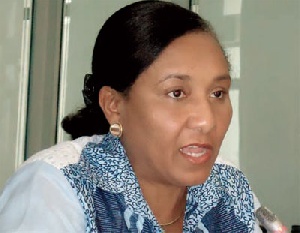 Deputy Finance Minister Mona Quartey
Deputy Finance Minister Mona Quartey
The Danish government is hopeful ratification of the convention for avoidance of Double Taxation agreements (DTA) with Ghana -- and the Prevention of Fiscal Evasion with respect to taxes on income and capital gains between the two countries -- will help to double Denmark’s investment in the country.
This brings to nine the number of countries that Ghana has signed a double taxation agreement with, including Britain, France, Italy and Germany.
Parliament approved the DTAs before it went on recess last month, and according to the Deputy Finance Minister Mona Quartey the agreement was desirable and helpful; and she believes Ghana stands to benefit.
“It will give investors a stable and predictable tax environment, which will encourage investment in Ghana.”
She further added to the Parliamentary finance committee, “It will eliminate situations whereby income from one of the treaty countries are taxed twice”.
Statistics from the Ghana Investment Promotion Centre (GIPC) reveals that direct investment from Denmark to Ghana in early 2014 amounted to over US$57.6million.
The Finance Committee report of Parliament also indicated that imports from Denmark to Ghana in 2014 stood at Gh¢144.9million, while exports to Denmark in 2014 hit Gh¢24.6million.
A Double Taxation Agreement regulates the tax treatment of income or capital gains in situations where the same taxpayer is subject to tax in two states, with respect to the same income or capital gains.
It is thus expected that the ratification will also prevent a situation where revenue is transferred from one treaty partner to another, for example by the issuance of tax incentives.
It will also increase Ghana’s Exchange of Information network, which allows Ghana to exchange information with Denmark in order to mitigate tax evasion across borders and also for tax purpose.
Mrs. Quartey also maintained that Ghana will increase its tax treaty network, thereby meeting one of the recommendations made by assessors during Ghana’s Phase One Peer Review.
Besides, it will help remove impediments that hinder the movement of capital goods for the promotion of international trade and foreign direct investment.
The chairman of the finance committee, James Avedzi, also explained that the key areas of Danish development assistance to Ghana centres on sustainable human development, sustainable economic growth, macroeconomics, institutional reforms and sustainable livelihoods, as well as conflict prevention.
The support to these key areas are carried through five sector programmes including water and sanitation, transport, private sector development, good governance and human rights.
The Danish government has over the years played key roles in Ghana’s march toward economic prosperity and social inclusion.
Among the specific Danish government support to Ghana is the Health Sector Support Programme IV from 2008-2012, when an amount of US$63million was provided as the health sector budget for HIV/AIDS.
There was also implementation of the Ghana Shared Growth and Development Agenda from 2010-2014, with an amount of US$53million provided as general budget support.
Others are the Private Sector Development II from 2010-2014, when an amount of US$60million was disbursed to improve the private sector, establish a Skilled Development Fund, support agriculture and provide funds for the rural areas.